Oh, this poor little post.
I’ve sat down to write this maybe 10, maybe 20 times? Never got past the first sentence.
I haven’t posted anything, really, on my site since the beginning of February. Before that, I had couple posts in three or four months. I’d love to say I’ve been busy with my job, or traveling, or a new hobby – but the reality is none of that is true.
What has been happening, though, is I’ve been struggling with my health.
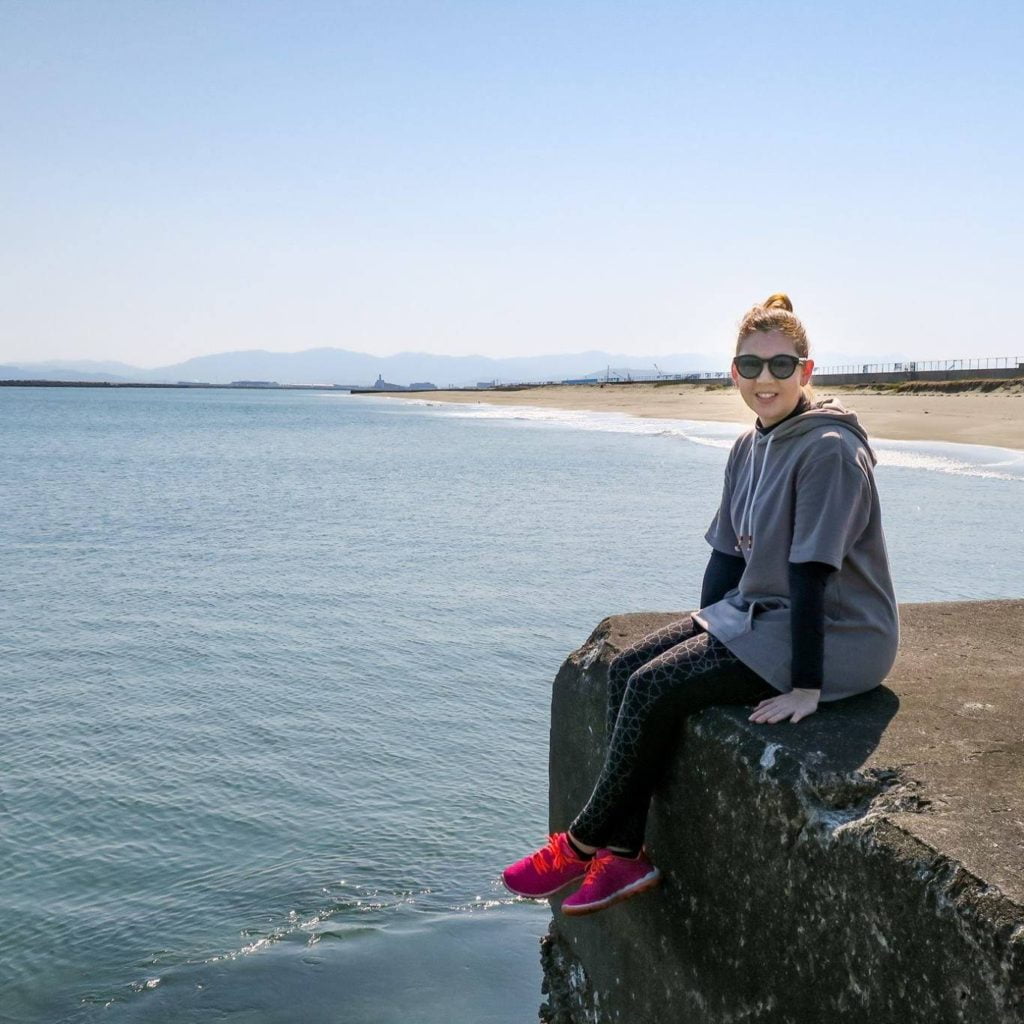
Since arriving in Japan, I haven’t been feeling 100%. For the first year or so, I attributed that to settling in and trying to get used to a new climate. I figured some of my just wanting to stay in bed was due to the fact that I was in my appropriately-temperate home, instead of out in the sauna that is Japanese summer, and the bone-cold winter where buildings are either left unheated or the people in them feel the need to crank the heat to a sweltering +35C (never mind the fact that no one will turn on the fucking A/C in the summer).
During my first year in Japan, I gained almost 10kg. I guessed this was because of quite a few reasons:
- Japanese food is the most delicious in the world.
- I had enough money to buy whatever groceries I wanted/eat out wherever I wanted.
- I have to drive everywhere so I barely walk anywhere.
- Did you see what I said about the weather? For like 8 months of the year I refuse to be outside.
- 800 calorie school lunches that I was forced to finish everyday.
Kinda makes sense, right? Combine that with me not being able to use the local gym or swimming pool (Japanese people have a real hang-up about tattoos…) and it’s a perfect storm for weight gain.
But then, I started walking for an hour every day after school in a lovely park near my schools. I quit eating sugar, and stopped eating so many delicious deep-fried foods. I did online workouts when it was too hot or cold to walk outside.
I gained 5 more kilos. And I felt like shit.
Finally, last December around Christmas, I saw a photo of myself and was shocked. My weight had ballooned to 83kg (over 180lbs) on my 5’7″ frame. My face was not only chunky, but super puffy, sallow, and my skin was constantly broken out to a horrific degree. The corners of my mouth were permanently cracked open and sore. I had started going to bed as soon as I got home from school, and not being able to get back out. My hair was falling out, and all my joints ached. I was absolutely exhausted and hated going to my elementary school classes because my students were sapping all of the tiny bit of energy I had each day. My FitBit was telling me I was sleeping 10-12hrs a night.
I sat myself down and really checked in. Was this depression, rearing its ugly head? Was this some sort of severe culture shock, setting in a year and a half after arriving? Was I just being a lazy piece of shit? Or was something else going on?
After talking with my family about what was going on, one of my aunts reminded me that thyroid disease ran in the female side of the family. The the ones who were diagnosed with it all found out in their early 30s, and had the same symptoms I was having. She encouraged me to at least get it checked to rule it out. As I started Googling, I realized she was right – I was exhibiting literally every symptom of low thyroid function (hypothyroidism).
I have some gripes about daily life in Japan, but the way you see a doctor here is not one of them. I told my supervisor that I wanted to see an endocrinologist who specialized in thyroid disorders, and the next day she told me she had booked me an appointment with the top guy in the big city near where I live. The appointment was the next week. No messing around with going through a GP first, no wait list. Just call the specialist you want to see and make an appointment.
I made a list of symptoms and the tests that I wanted run, and asked my supervisor to look at it in case I needed her to say it in Japanese. I looked up the reasoning for all the tests to have ready in case the doctor didn’t want to do them – I had seen so many North Americans online struggling to have their doctors run a full panel.
When we went to my appointment, the doctor greeted me in flawless English, read my list of symptoms in English, looked at the tests I wanted, said “ok, no problem” and sent me down the hall for bloodwork. I came back to the examination room and he wheeled in an ultrasound machine, did a thyroid exam and ultrasound right then and there, and then by the time I sat up, the bloodwork results were back from down the hall. I was literally speechless. In Canada, the doctor / lab / ultrasound are all different places where I’d have to make three different appointments. We wait WEEKS for bloodwork results, and have to make another doctor appointment for them to tell us the results. I was shocked at how quickly everything happened.
The doctor looked over my results and announced that I had Hashimoto’s Disease. My thyroid was inflamed/enlarged on the ultrasound, and my antibody levels were sky-high. “Your body is attacking and killing your thyroid”, he said, “which means you have an autoimmune disease”. I left the office after discussing treatment plans and the schedule for bloodwork (I’ll have to get my thyroid levels checked every six months for basically the rest of my life). I sat in my car for 20 minutes before driving home, feeling betrayed by my body for getting confused and attacking itself. “Why are you destroying your own thyroid? You need that! Get your shit together, immune system!”
The first thing I did when I got home from the doctor was call my supervisor, told her the news, and asked her to advise my schools immediately that I would no longer be eating the kyushoku (school lunch). I had a feeling for a long time that the school lunch was making me sick, and I was right. You might have an image in your head of the school lunches in Japan, and for some schools you might be right if you’re picturing broiled fish, pickled veggies, salad, miso soup, and a bowl of rice. However, in my area, they are not like that. Common lunches include: yakisoba noodles with a baguette and fruit salad in sugary yogurt sauce; fried fish with cheese on it, a tablespoon of shredded cabbage, oily soup full of chikuwa (processed fish cake) and a bun; rice, deep-fried bean & fried tiny whole fish, super mayonnaise-y coleslaw. The kids’ favorite school lunch is the one where they get agepan – an entire fried roll the size of a huge hamburger bun and covered in sugar.
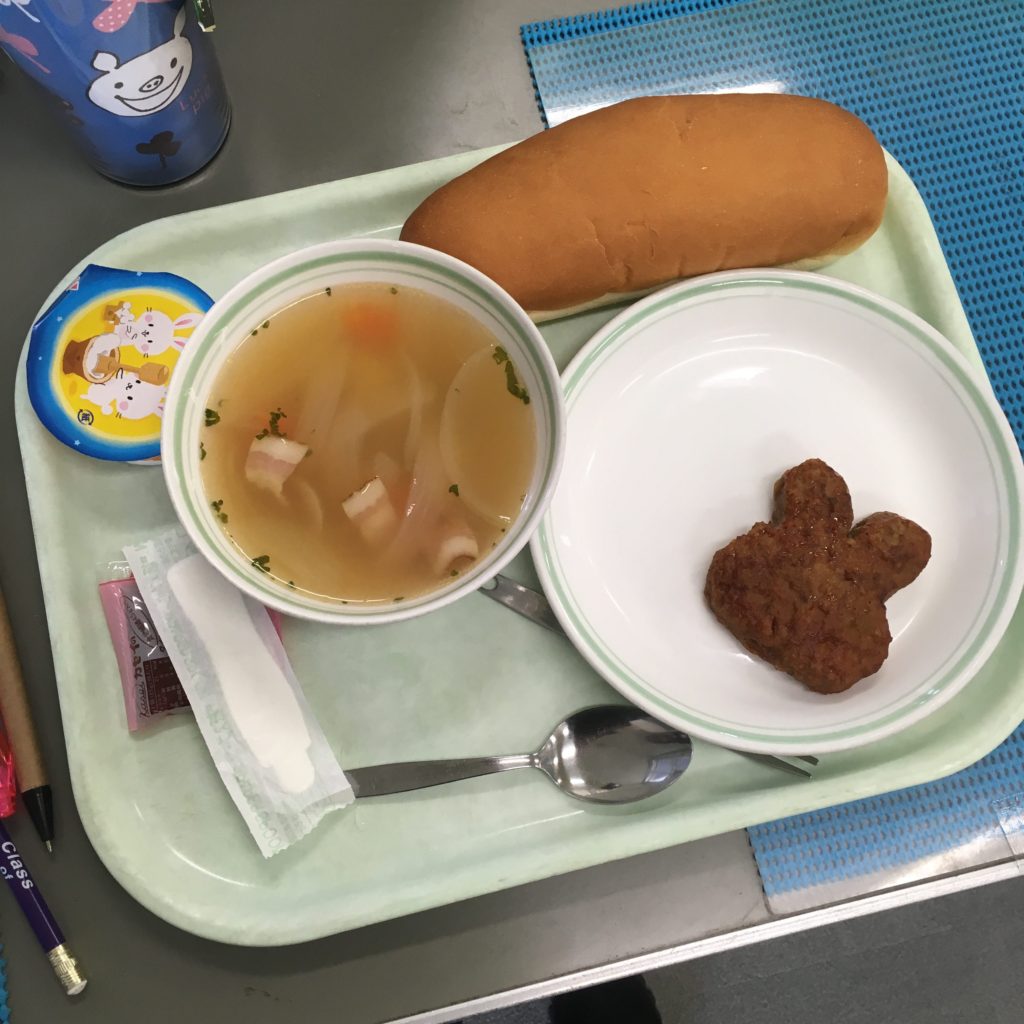
The school lunches are usually 700-900 calories and super high-carb (designed for kids who don’t eat anything else from breakfast till dinner – no snacks allowed at school – and who are playing sports for two hours after school) and designed to be as cheap as possible. The school lunches got even worse when the kitchens in the schools were closed last year and my city opened a school lunch center. Now all meals for every student in the city are exactly the same. They’re prepared in the same place and trucked out to the schools. They are carbs on carbs on carbs on sugar. I don’t think they’re healthy at all. And since I had to eat with the students at my schools, that meant I was forced to eat everything on my plate. It was making me sick, and I knew it.
I’m not saying that the school lunches caused my autoimmune disease – this disorder usually has a genetic predisposition plus often seems to be “activated” by a virus (interestingly enough, I was able to trace back some of my symptoms to getting dengue fever in Roatan), but they certainly weren’t helping, and I feel like they were causing damage and making me feel unwell. I also had markers for celiac disease in my bloodwork, which means I should not be eating any gluten at all, and I was eating it daily.
As soon as I got home, I adjusted my diet. I knew from all the research I’d been doing into Hashimoto’s Disease that the following things were out: gluten, sugar, corn, soy, dairy, legumes, millet, and processed food. What was in: meat, veggies, oils, nuts, a little fruit…. and that’s about it. The main idea is low carbs, more protein, and more fat. Anything inflammatory is out, as that makes autoimmune disease worse. My days of drinking chuhais (canned highballs) after a hard day of work are over. I try to stick as close to the autoimmune protocol / autoimmune paleo diet as possible.
It was a really sad day for me when I tried to eat ramen, my favorite food of all time, and broke out in hives. I tested it two more times just be suuuuuuuper sure, but every time I eat gluten now, I end up itchy and miserable.
I started meal prepping on Sundays. I make 5 breakfasts and 5 lunches to take to work. It’s become a therapeutic time for me, as strange as that sounds. On Saturdays I plan out the menu and go grocery shopping. Sunday mornings are for cooking. It’s a challenge and kind of a puzzle to get everything made in my little Japanese kitchen. I have extremely limited counter space (like about 10 inches by 20 inches), and only one burner. No real oven (just a microwave oven with convection). I can’t have my toaster oven, microwave oven, and pressure cooker all on at the same time or my kitchen breaker blows. But I just put on Spotify and cook like hell for a few hours, and then I feel really accomplished once I have everything in 10 little containers in the fridge! Here’s a couple examples of my breakfast and lunch from last week:
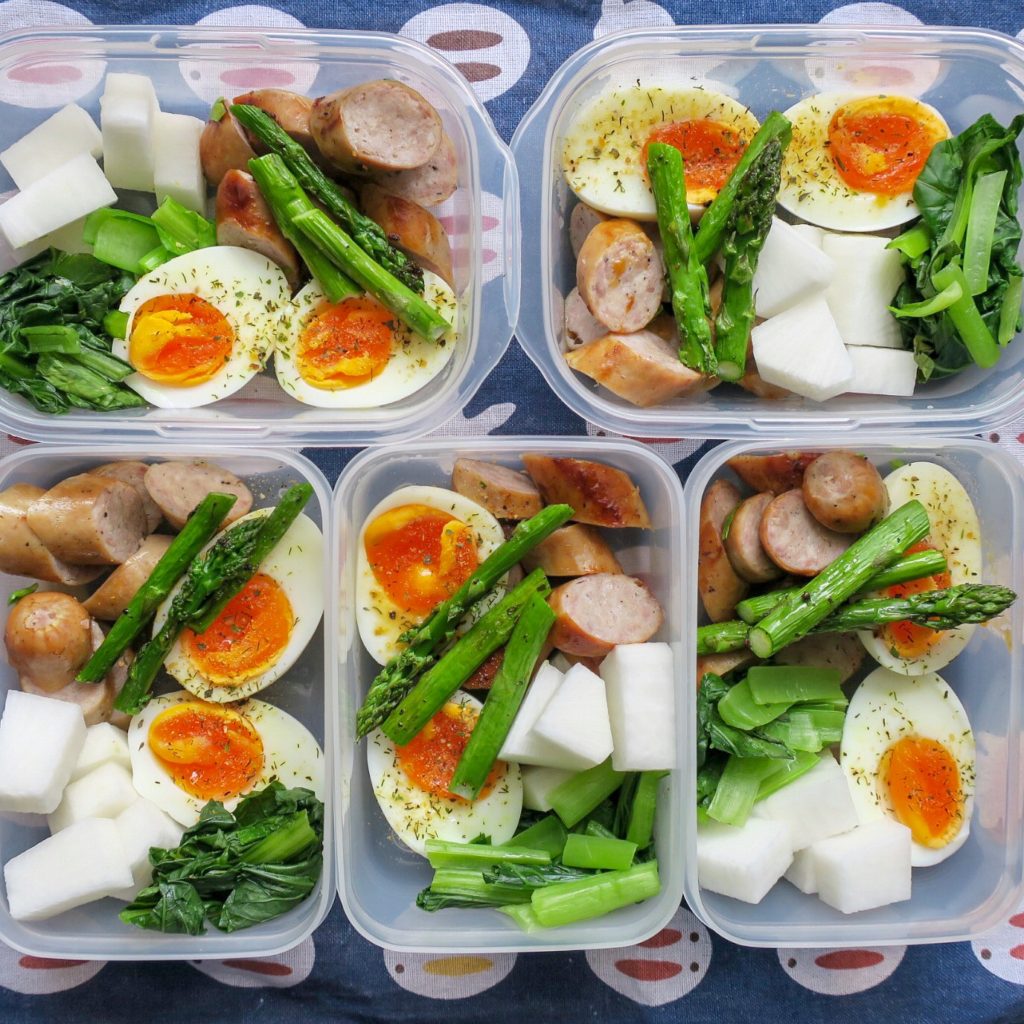
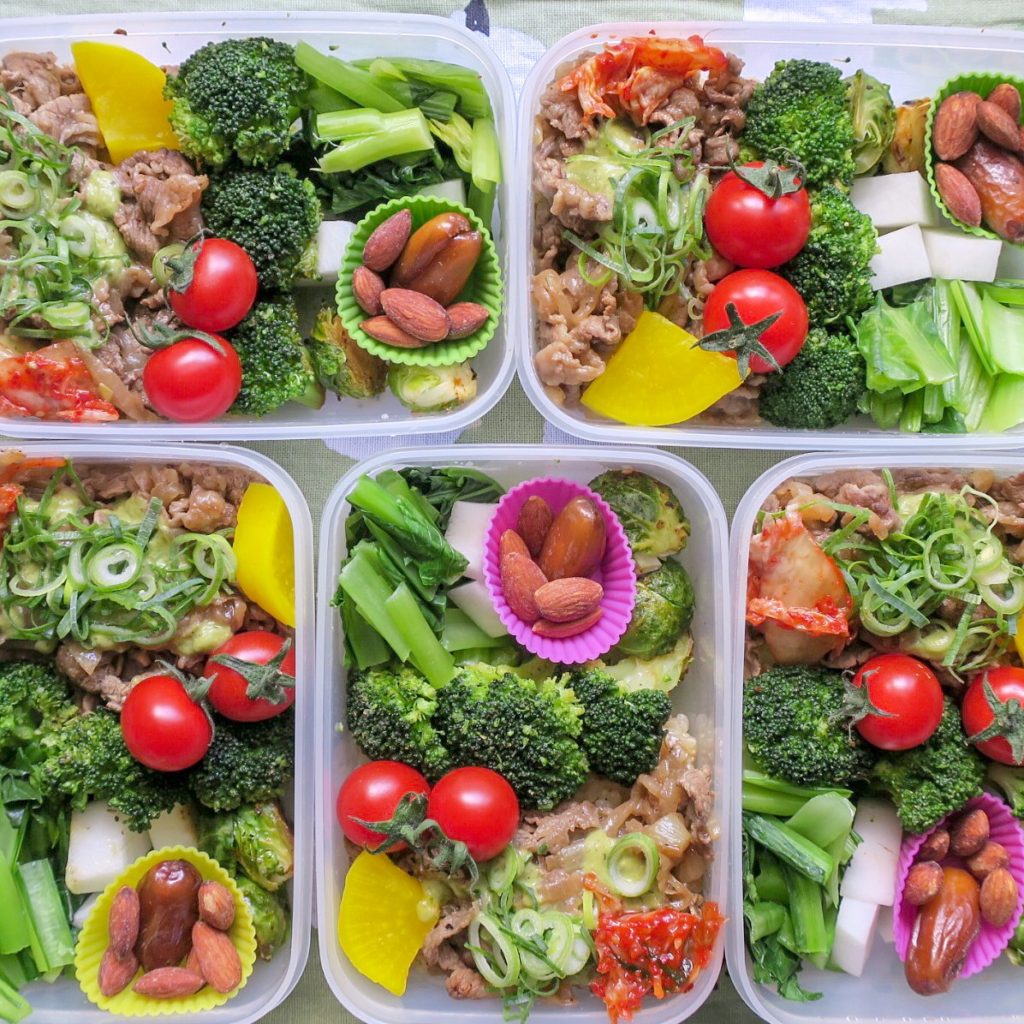
I also take supplements recommended to me by my endocrinologist. The thyroid is the “master gland” of the endocrine system, so if it’s disrupted, usually all the hormone systems (adrenal system, reproductive hormone system, etc.) are affected. (You should have these personally recommended to you by your MD / naturopath / functional or integrative medicine doctor / etc. based on your situation so please don’t ask me for what I’m using. I can’t give medical advice.)
I changed my lifestyle a bit. I was never a super busy person, but I started saying “no” to things that stressed me out or would end up in me being out super late and not getting a good sleep. I made peace with the fact that I was now pretty difficult to go out for dinner with due to my food restrictions, so I concentrated on other activities with my friends and stayed home to cook myself delicious dinners. I cut down my Japanese lessons to once a week, and started hosting my weekly Terrace House viewing parties at my house earlier so that I can go to bed at a reasonable time. And I stopped stressing myself out about writing posts for this blog (especially since I haven’t really been doing anything interesting anyway)!
If it’s of interest to you in hearing more about how I’m handling this in Japan, please let me know in the comments below or by email. I can do a more detailed post about having an autoimmune disease here in Japan, if people want it. It was very difficult for me to find English information about food / restaurants / groceries / ingredients / etc. or explaining my condition in Japanese, so I’ve had to figure all that out by myself. I’m happy to write about it if it will help someone else.
So, that’s the reason I’ve been disappearing and reappearing for the last five months. As things level out, I’m feeling better and better each day. I’m still not at 100% and have had a few backslides as I get my new life figured out, but overall things are feeling positive. I’ve lost 5kg, my hair is starting to grow back, my skin is clearing, I have a little more energy, and I’m not sleeping 11 hours a night anymore. I hope to be writing more soon – I still have a few posts from Roatan last summer hanging around, as well as a few trips I took around Japan in the last few months. But they’ll get here when they get here, because I’m taking as much time as I need to get myself sorted out.
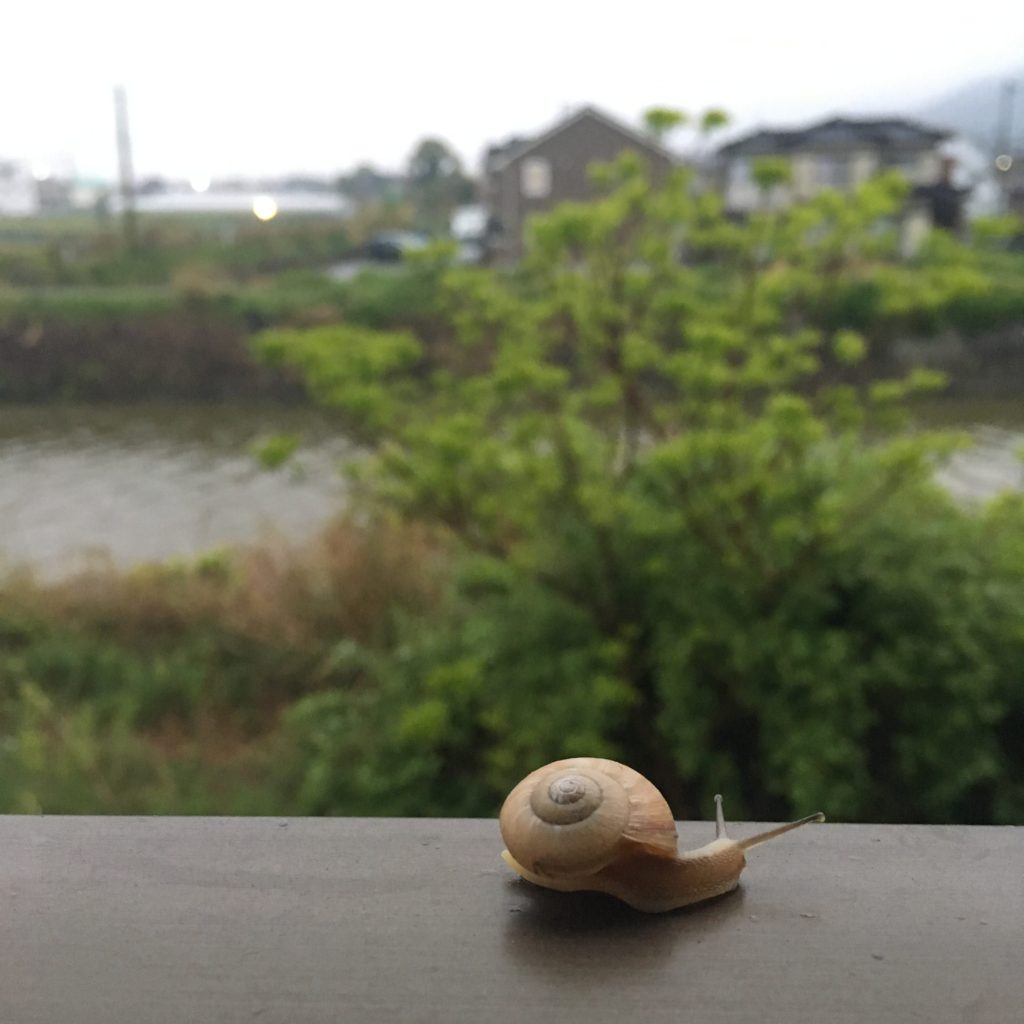
Thanks for all the support and for those who have stuck around! I can’t tell you how great people have been. I was talking to my friend Katie about all this recently, and she came back after our conversation with a Google Drive link – she had gone through her favorite cookbook looking for recipes that I could eat and snapped photos of them, and uploaded them to a folder for me. So sweet. My girl Alex checked in with all the food providers on her upcoming Wander Women Retreat to make sure I’ll always have something I can eat. (And yes! That’s an announcement that I will be attending Alex’s retreat in Thailand in August!!!!! There’s still a couple spots left, come scuba dive & do yoga with us!)
I also have to give props to my fellow ALTs here for being amazing. One of them often spends time scouring the internet for my random requests like gluten-free beer or preservative-free meat. He translates ingredient lists for me, and gives me a heads up when he sees something at the grocery store that I can eat. All of them have changed dinner plans to go somewhere that I can eat the food, and usually check the ingredients before recommending something to me. They’ve been great, and it helps me a lot to have people who care close by too (Japanese people have been overall sympathetic but not great at understanding my condition). So I do have a good support circle, both far and wide.
With much love… see ya when I see ya 🙂
Want more Cubicle Throwdown in your life? Of course you do, you rockstar. You can follow me on Facebook, Twitter, Instagram, G+ and Pinterest, if you like. You can also add me to your Bloglovin’ feed, or email me! If social media is not your jam and you just want my posts straight to your inbox, check out the sidebar and put your email address in the “Never Miss A Post” box. No newsletters or spam, just my posts – scouts honor. xo!
Hey Rika! Let me tell you, this post is incredibly reassuring for me and helps me feel a bit better about one of my most pressing concerns about going to live in Japan. I was just accepted to the JET Program for the 2019 year and while I am very excited about many things, the nagging concern about how I will prepare food has persisted in the back of my mind since a couple of months ago when I was officially diagnosed with Celiac. I lived in Japan for 6 months for a study abroad experience so it’s not my first rodeo, but I didn’t know about my disease then so despite knowing it will all work out it’s still slightly nerve-wracking!
I know it’s been almost a year since this post but I would love to hear more about how you have dealt with food at restaurants or groceries or learning to read ingredients over the last year, and what your general advice is for dealing with an autoimmune disorder in Japan. I’ve been reading through lots of blogs about celiac/autoimmune disorders in Japan but many of them are by travels who were only in the country for a short period of time. I know there’s only so much I can read, and that a lot of it will be a learning experience once I get there, but it’s really nice to read about someone else in the JET Program with the same situation. Thanks so much for the wonderful and informative posts!
Hey Meg! First off, congrats on getting shortlisted for JET!
Don’t worry about being able to prepare food – I’ve been eating here this way for over a year. It’s annoying, but doable. The main two things are that you’ll have to prepare your own lunches if you get ES/JHS (SHS you don’t eat with students anyway and you can leave the school or do whatever for lunch, so if you get SHS you’re in the clear), and you need to start learning how to read Japanese food labels right now if you can’t already.
For ES/JHS, you might find your schools don’t want you eating a bento with the students (everyone here has to be the same, and all that jazz). It just depends on the school. My schools don’t want me eating with the kids and that’s absolutely fine with me. I have a ton of classes and I want a break at lunch. JHS kids and older ES kids aren’t that thrilled about eating with the ALT anyway. However, there’s another ALT in my town with a fish allergy, and her schools let her eat with the kids. Your mileage may vary!
Restaurants are not so bad – there’s a set amount of places where you’ll be able to eat (sushi, yakiniku, sukiyaki, Cocoichiban Curry, Mos Burger, etc.) and within those places you’ll get to know what’s safe and what’s not. Things to watch out for are asking if something contains soy sauce (Japanese people generally don’t know about gluten being in soy sauce and they love to put that in everything), and sushi vinegar being made with malt barley. Big chains like Coco Curry and Mos Burger have allergen-friendly items that are safe to eat. I like going for sukiyaki the best, because I just get the normal broth (it’s just a piece of kombu) and then I can get as much meat and veg as I like. Super easy.
For grocery stores, you’ll have to be able to read labels as there’s a lot of hidden gluten in things like mizuame (barley based sweetener), soy sauce, etc. In ingredient lists. Gluten intolerance/celiac disease is not well known in Japan and is rare here, so things are not labeled the way they are in North America and Europe. Wheat is always going to be listed in the allergen list, but barley, rye, etc. Won’t be. And not all packaging has an allergen list as it’s not the law here. So you definitely have to be able to read ingredients. The good news is that it’s mostly the same kanji over and over so you’ll get used to it quickly. If you’re near a Jupiter or Kaldi (specialty foreign food stores) you’ll be able to get lots of stuff, and Aeon grocery stores are starting to stock a lot more allergy-friendly items. Even in my inaka grocery stores I can get allergy-free curry roux, gluten free soy sauce, and rice flour. Most other things I get on iHerb.com (they’re a lifesaver here – email me if you want a referral code for a discount) or Japanese Amazon (all nut-based flours and stuff like that have to be bought from Japanese Amazon now because customs recently banned it).
Can you speak Japanese? Being able to explain your allergy is important, and knowing the right questions to ask is helpful too. It’s really on us to be able to ask the right questions and give the right info because this is not well-known in this country.
If you end up near a major city you’ll be in luck as Osaka, Kyoto, Tokyo, etc all have some specialty 100% GF restaurants and you can get Japanese food like okonomiyaki etc that you wouldn’t be able to eat otherwise.
I highly recommend joining the “Gluten Free Expats Japan” FB group right now and start combing through the posts as there’s TONS of info in there. Take a look at the files too, as they’ve curated a list of “hidden gluten” items and ingredients on labels to look for. That’s really important.
Also, having some enzymes or activated charcoal (can buy on iHerb) to have on hand is really important. It’s pretty difficult here to avoid 100% cross contamination unless you’re eating at home. Inevitably you will get glutened at some point so it’s good to have something on hand that at least helps you get through the results of that.
Please keep in touch and feel free to email anytime if you have more questions or want to chat more!! There’s lots of people with celiac disease here and although it’s not exactly easy, it’s definitely doable and you’ll be ok!
PS: Mister Donuts has an allergen-free donut that’s delicious! It’s sold frozen and you have to take it home and cook it yourself (to avoid cross contamination). Just ask them for the “fuwa fuwa donuts” and they’ll know what you mean!
So sorry to hear you have been struggling with this! I also have hashimoto’s and I live in Shanghai, so I know your pain! Giving up dumplings was one of the saddest days for me. I’d love more info on how you’re coping and if you’ve found any great destressing ideas to try!
Oh no!! Yeah, I can definitely commiserate. Dumplings are so good 🙁 I have a follow up post in the works! Stay tuned!
Kat, nothing to worry now because you started taking medication for hypothyroid. Some times people fail to test themselves for thyroid deficiency and end up facing more trouble. I’m 38 suffering from hypothyroidism since 5 years and I’m completely normal now. But I got to pop in thyroxine tabs for my lifetime with regular checkups. Avoid deep fried foods as much as possible and ensure that you don’t eat vegetables that is not good for your condition. I saw broccoli in the photographs.. It isn’t good. Have a great time ahead and let me know when you come to India.
Did I address you Kat? Rika?
Hi, yes, I’m Rika!
Thanks for the comment! About the broccoli, I only eat it steamed or roasted these days (it’s roasted in that photo). Cooking broccoli breaks down the goitrogenic (goiter-causing) compounds that are harmful for those of us with thyroid disease. So raw broccoli should definitely be avoided! But mine is cooked, so it’s ok 🙂 Thanks for the concern!
So glad you were able to figure out the underlying cause of your discomfort! Autoimmune diseases are sneaky little bastards. Cheers to you putting yourself first! Sending love xo
Sneaky little bastards indeed! Thanks chica! xoxo
I’m glad to hear things are getting better for you! Diagnosing allergies is often the hardest step, finding food you can eat being the next challenge. But once you’ve got into a groove of what grocery stores and restaurants etc you can go to, it gets much easier – and judging by those delicious looking lunches it looks like you’re already in the swing of things! I’m also allergic to gluten and will be applying to JET for next year, so I’d love to hear how you’re getting on with glutes free food in Japan! Much love from London
Hiya Adam! Thanks for the support. I have a post in the works about gluten free in Japan, so stay tuned! Gluten free isn’t the difficult part here, thankfully (it’s the soy-free part that throws a wrench in things most of the time) and even in my little town I’m only 35 minutes from a big Aeon Mall that has all kinds of specialty food. Though it’s super easy in the regular little grocery store to just pick up meat, veg, rice, rice noodles, etc. There’s even gluten-free soy sauce in the grocery store in my town! It’s definitely possible and there are JET support groups for pretty much everything, including gluten-free, so there’s lots of resources around. Best of luck with your application!!
Good job Rika. Hang inthere!
Thank you Fabian!! Will do 🙂
Getting diagnosed is the first step to life being awesome again!!! I’m a Portuguese-Canadian who lived on bread and got diagnosed with celiac disease 7 years ago. Going gluten free was the worst, until it wasn’t. Once I started feeling good again and found my new groove it hardly affected my life. Yes you probably will cry at the grocery store when you realize you “can’t eat anything” (speaking from experience!!!) but once you realize that’s actually so not true, you’ll be okay!!! You’ll have days you just want to eat all your old favourites, but stay the course, you’ll thank yourself for it!
Hi Katrina!! You’re definitely right. It’s pretty tricky in Japan, just due to not being able to read so many things and gluten intolerance/celiac disease not being well known here. But I really do feel better when I’m steering clear and I have paid for it dearly the few times I said, “oh who cares, I’m gonna eat this anyway!” It’s worth it for sure.
Your attention to self care and getting yourself back on track is so admirable! I understand what it’s like to be stubborn and not accept your situation until it’s screaming at you in your face, but it’s good to see that you’ve tackled it and have a new routine going.
Also, I totally second anyone thinking of going on the retreat!!!! So many “can’t waits” thrown in there 😎😎😎
Oh man, how did I miss this? Thanks chica, and thanks again for all the killer recipes you sent!
Cannot WAIT to see you at the retreat!
I have been following a GF diet since 1999, for medical reasons also, …long before it was popular and before there were any options besides Rice Krispie cereal. You certainly couldn’t go to a restaurant and ask for a GF menu at that time! I am so happy for you that you are embracing the challenge and taking charge! …its a hard road but so very worth it when you look back in a few yrs. You won’t regret it! I offer you all the (virtual) support I have and know that you will succeed! Sincere regards from Victoria BC
Hi Robyn! Thanks for your support, I really appreciate it!! I’m so impressed that you were able to maintain a GF diet since 1999. I know it definitely was not well-known back then! It is hard, but as you say, it’s worth it. I miss some foods but I’d rather be feeling well 🙂
I’m so sorry to hear that you had to go through this, but kudos for tackling it head on and taking the time to refocus. It’s so easy to take our health for granted and when something like this happens it’s really shocking. It’s a long process to figure it all out and to form new habits and I wish you the best of luck on your journey! Looking forward to reading more posts in the future.
Thank you lovely!! It’s definitely been a long road, and food habits are sooooo hard to change. But the results speak for themselves, and I’d rather feel better! Thanks for the support. xo